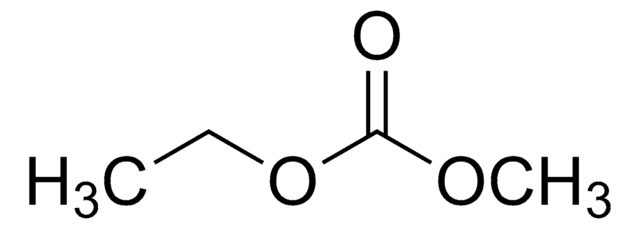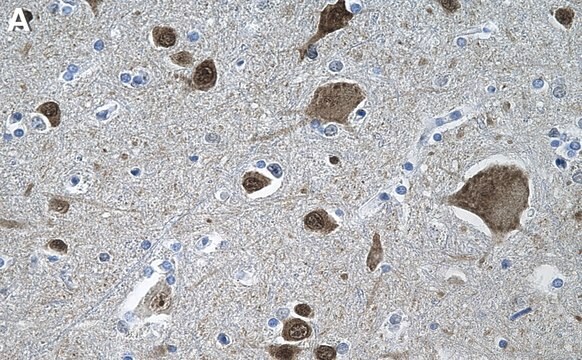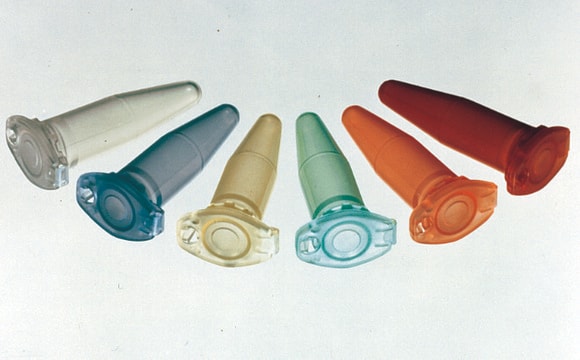ZMS1130
Anti-GABRB2 Antibody, clone BD17 ZooMAb® Mouse Monoclonal

recombinant, expressed in HEK 293 cells
Synonyme(s) :
Gamma-aminobutyric acid receptor subunit beta-2;GABA(A) receptor subunit beta-2
About This Item
IHC
WB
immunohistochemistry: suitable
western blot: suitable
Produits recommandés
Source biologique
mouse
Niveau de qualité
Produit recombinant
expressed in HEK 293 cells
Conjugué
unconjugated
Forme d'anticorps
purified antibody
Type de produit anticorps
primary antibodies
Clone
BD17, recombinant monoclonal
Gamme de produits
ZooMAb® learn more
Forme
lyophilized
Poids mol.
calculated mol wt 54.45 kDa
observed mol wt ~52 kDa
Produit purifié par
using protein G
Espèces réactives
human, mouse
Réactivité de l'espèce (prédite par homologie)
bovine, feline, rat, monkey
Conditionnement
antibody small pack of 25 μL
Caractéristiques du produit alternatif plus écologique
Waste Prevention
Designing Safer Chemicals
Design for Energy Efficiency
Learn more about the Principles of Green Chemistry.
Validation améliorée
recombinant expression
Learn more about Antibody Enhanced Validation
sustainability
Greener Alternative Product
Technique(s)
immunofluorescence: suitable
immunohistochemistry: suitable
western blot: suitable
Isotype
IgG1κ
Séquence de l'épitope
Unknown
Numéro d'accès Protein ID
Numéro d'accès UniProt
Autre catégorie plus écologique
Conditions d'expédition
ambient
Température de stockage
2-8°C
Modification post-traductionnelle de la cible
unmodified
Informations sur le gène
bovine ... GABRB2(540657)
Description générale
Spécificité
Immunogène
Application
Evaluated by Western Blotting in Mouse liver membrane preparation.
Western Blotting Analysis (WB): A 1:1,000 dilution of this antibody detected GABRB2 in Mouse liver membrane preparation.
Tested Applications
Immunohistochemistry (Paraffin) Analysis: A 1:100 dilution from a representative lot detected GABRB2 in Human brain and Mouse brain tissue sections.
Immunofluorescence Analysis: A 1:100 dilution from a representative lot detected GABRB2 in Human cerebellum tissue sections.
Note: Actual optimal working dilutions must be determined by end user as specimens, and experimental conditions may vary with the end user.
Description de la cible
Forme physique
Reconstitution
Stockage et stabilité
Informations légales
Clause de non-responsabilité
Vous ne trouvez pas le bon produit ?
Essayez notre Outil de sélection de produits.
Code de la classe de stockage
11 - Combustible Solids
Classe de danger pour l'eau (WGK)
WGK 1
Point d'éclair (°F)
Not applicable
Point d'éclair (°C)
Not applicable
Faites votre choix parmi les versions les plus récentes :
Certificats d'analyse (COA)
Vous ne trouvez pas la bonne version ?
Si vous avez besoin d'une version particulière, vous pouvez rechercher un certificat spécifique par le numéro de lot.
Déjà en possession de ce produit ?
Retrouvez la documentation relative aux produits que vous avez récemment achetés dans la Bibliothèque de documents.
Notre équipe de scientifiques dispose d'une expérience dans tous les secteurs de la recherche, notamment en sciences de la vie, science des matériaux, synthèse chimique, chromatographie, analyse et dans de nombreux autres domaines..
Contacter notre Service technique








